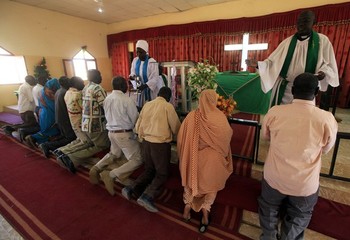Christian proselytizing activities in Sudan are limited, says minister
April 17, 2013 (KHARTOUM) – Sudan’s minister of Guidance and Endowments, Al-Fatih Taj El-sir, downplayed the existence of Christian proselytizing activities in the country while announcing that no new licenses for building churches will be issued.

He went on to say that there will be no need for new churches as the existing ones can accommodate worshipers but stressed that the freedom to worship is guaranteed in Sudan.
Since early 2013, Sudanese authorities have started scrutinizing the activities of Christian organizations in the country.
Following the detention of a recent convert to Christianity and several Coptic Church representatives in December 2012, authorities have reportedly destroyed several churches in and around the Khartoum area.
A number of foreigners accused of proselytizing were also deported, while authorities conducted raids on a number of religious institutions, confiscating books to check on their content.
Several church-affiliated institutions such as orphanages or schools have also been closed, according to the Geneva-based World Council of Churches, a global ecumenical church body.
In April 2012, a violent crowd ransacked the compound of a Presbyterian church in Khartoum, burning Bibles and looting the buildings.
In a separate incident last June, bulldozers sent by officials from the ministry of planning and housing destroyed two church buildings belonging to the St John Episcopal Church in Khartoum, claiming worshippers lacked a permit to occupy the land.
Sudanese officials including president Bashir made it clear that following South Sudan’s independence the upcoming constitution will be “100% Islamic” but opposition parties say that this is a cover for oppressive laws.
Some critics assert that the separation of Sudan into north and south in July 2011 was in part a result of Khartoum’s insistence on Islamic law.
(ST)
